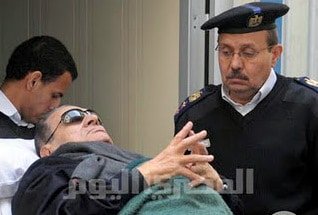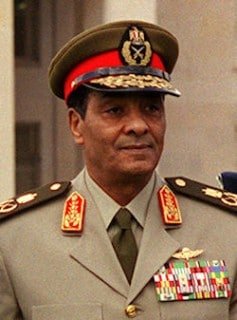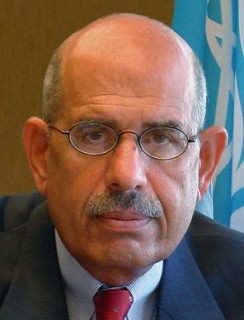
“The revolutionary public opinion and demands that were created in Tahrir square needed to be politically purused by revolutionary cadres and leadership.”
Dr. Ashraf Ezzat

“Mubarak is neither a tyrant nor a bloodthirsty man …
He is a clean man, who could say no wrong. Mubarak has seriously and faithfully worked to the best of his abilities and energy for Egypt and its people and lived a life burdened by his nation’s problems” Said Fareed El-Deeb, Mubarak’s lawyer as he argued his case at a latest hearing and just days prior to the first anniversary of the Egyptian revolution.
“Mubarak is worthy of justice and no one should discredit his efforts, question his loyalty or history. There is no evidence to prove that Mubarak gave orders to open fire on the protesters or even to prove he sealed the natural gas deal with Israel … and how could you accuse Mubarak of killing the protesters when he, in fact, supported the revolution” added El-Deeb.
Mubarak can’t be proven guilty and his lawyer hails him as a pro-democracy liberal who looked favorably on the Egyptian uprising. … It’s funny and almost surreal but that’s how Mubarak’s trial is proceeding. It’s true that Egyptians like jokes but not this kind of mockery of justice.

Key witnesses in the deposed president’s trial, Mr. Omar Soliman, Mubarak’s vice president and former chief of intelligence and Field Marshal Houssein Tantawy, the minister of defense and the current head of the supreme council of armed forces (SCAF) declined to attest that Mubarak gave direct orders to shoot the peaceful protesters.
This Actually comes as no surprise, after all, those were Mubarak’s long time loyal aides and anyone thought or expected differently was probably living in a world of make believe.
And on the other hand any down to earth reading of a post-Mubarak Egypt would have most likely excluded the guards of the old regime out of the newborn political scene. But we’re talking here of the reality of a revolution that only managed to topple the head of the despotic regime … but not the regime itself.
The 18 days (January 25- February 11) of the Egyptian uprising have been the most fantastic story in Egypt’s modern history but unfortunately every story has to come to an end. And what we’ve been witnessing throughout an entire year is the gloomy and systematic hijacking of that revolution.
Academically, the revolution is defined as a fundamental change in power or organizational structures that takes place in a relatively short period of time.
What the millions of Egyptians did in 18 days was absolutely revolutionary in every sense of the word, but the mass mobilization, a rare phenomenon in a society known for its propensity for stability and obedience , was not the only recipe for a successful regime change.
Other factors had to be incorporated; the miraculous mass mobilization in Tahrir Square the whole world was mesmerized by had to somehow turn into a political force. The revolutionary public opinion and the revolutionary demands that were created in Tahrir square needed to be politically purused by revolutionary cadres and leadership.
The public opinion, no matter how strong, in and of itself is not capable of changing the political direction, and that is one lesson the Tahrir revolutionaries had to learn the hard way throughout the last year.
The lack of organized secular political parties that really believed in the necessity for a regime change in Egypt, that could have reflected the revolutionary tide on the street, and somehow could have offered a considerable counterweight to the Islamists, is what really crippled the Egyptian revolution and hindered its tide.

The Egyptian revolution couldn’t stay grassroots forever; Tahrir square needed a leader as powerful and vibrant as the Tahrir protests. And that is what the saga of Tahrir square critically lacked.
Indeed Mr. Mohamed El-Baradei could have made a good president for post-Mubarak Egypt- of all the presidential hopefuls he was and still is my personal choice- but unfortunately, while the man had the right vision and the most impressive portfolio of political expertise he lacked the charisma and the perseverance needed to lead the revolution out of Tahrir square and advance it into the political arena.
El-Baradei could be active on the internet social media where he communicates with the liberal and educated factions of the Egyptian society, but he has no popularity on the Egyptian street, and if the Egyptian revolution was a facebook/Twitter revolution the man could have easily secured his bid for the presidency.
With the withdrawal of El-Baradei from the presidential race, a move that relieved many in the Israeli political circles for they knew beyond doubt that a politician of his caliber could turn Egypt into a vibrant and powerful democracy, the presidential race hasn’t only narrowed but also weakened with the remaining candidates merely representing the old regime and the political Islam.

The Egyptian revolution is only one year old and the situation will probably get worse before it gets better as the military eyeing to preserve its own political and economic autonomy and maintain its de facto status as a state within the state.. The first post-revolution parliament has just held its first meeting, and if it is anything it is certainly not the revolution parliament.
But we are where we are, so the next question is whether the Tahrir square revolution will actually fulfill its promise of “dignity, freedom and social justice” or whether it will simply usher in an era of extremist Islamist regimes or new forms of military authoritarianism.
The thousands of Egyptians who packed Tahrir square and other squares in Egypt’s major cities on January 25, the first anniversary of the revolution, will not be celebrating the day as most of the revolution’s demands remain unmet, but they will be protesting again, they will make it clear for all the people in power that the Egyptian revolution continues to empower its people.

Ashraf Ezzat is an Egyptian born in Cairo and based in Alexandria. He graduated from the faculty of Medicine at Alexandria University.
Keen not to be entirely consumed by the medical profession, Dr. Ezzat invests a lot of his time in research and writing. History of the ancient Near East and of Ancient Egypt has long been an area of special interest to him.
In his writings, he approaches ancient history not as some tales from the remote times but as a causative factor in our existing life; and to him, it’s as relevant and vibrant as the current moment.
In his research and writings, Dr. Ezzat is always on a quest trying to find out why the ancient wisdom had been obstructed and ancient spirituality diminished whereas the Judeo-Christian teachings and faith took hold and prospered.
Dr. Ezzat has written extensively in Arabic tackling many issues and topics in the field of Egyptology and comparative religion. He is the author of Egypt knew no Pharaohs nor Israelites.
He writes regularly at many well-known online websites such as Dissident Voice and What Really Happened.
Dr. Ezzat is also an independent filmmaker. His debut film was back in 2011 The Annals of Egypt Revolution and in 2012 he made Tale of Osiris a short animation for children.
In 2013 his short The Pyramids: story of creation was screened at many international film festivals in Europe. And he is working now on his first documentary “Egypt knew no Pharaohs nor Israelites”.
ATTENTION READERS
We See The World From All Sides and Want YOU To Be Fully InformedIn fact, intentional disinformation is a disgraceful scourge in media today. So to assuage any possible errant incorrect information posted herein, we strongly encourage you to seek corroboration from other non-VT sources before forming an educated opinion.
About VT - Policies & Disclosures - Comment Policy



